Derek Cianfrance The Place Beyond The Pines Interview
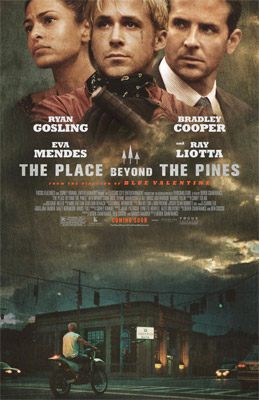
Derek Cianfrance The Place Beyond The Pines Interview
Cast: Ryan Gosling, Eva Mendes, Bradley Cooper
Director: Derek Cianfrance
Genre: Crime, Drama
Rated: MA
Running Time: 140 minutes
Synopsis: The daring new movie from the director of Blue Valentine, The Place Beyond the Pines is a sweeping emotional drama powerfully exploring the unbreakable bond between fathers and sons.
Luke (Academy Award nominee Ryan Gosling) is a high-wire motorcycle stunt performer who travels with the carnival from town to town. While passing through Schenectady in upstate New York, he tries to reconnect with a former lover, Romina (Eva Mendes), only to learn that she has given birth to their son Jason in his absence. Luke decides to give up life on the road to try and provide for his newfound family by taking a job as a car mechanic. Noticing Luke's ambition and talents, his employer Robin (Ben Mendelsohn) proposes to partner with Luke in a string of spectacular bank robberies – which will place Luke on the radar of ambitious rookie cop Avery Cross (Academy Award nominee Bradley Cooper).
Release Date: 9th May, 2013
Interview with Derek Cianfrance
Question: Ultimately, what do you see The Place Beyond the Pines as being about?
Derek Cianfrance: It's about legacy" what we're born with and what we pass on. It's about the choices we make and how those choices echo throughout generations. It's a classic tale of the sins of the father being visited upon the son.
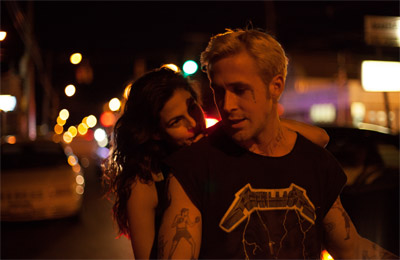 Question: Does this picture relate to your previous films?
Question: Does this picture relate to your previous films?Derek Cianfrance: It does, in that I am drawn to tell stories about families. My first film, Brother Tied, was about brothers. Blue Valentine was about husbands and wives. Pines is about fathers and sons. A theme that runs through Blue and Pines is the nature of masculine identity, reinvention or transformation of the self for a man over a period of time.
I feel that the cinema is a place where secrets are told. It's a place where we can travel to intimate places, to homes and bedrooms, and can witness private moments that reflect our own lives. Whereas Blue looked at this intimacy – a singular relationship – under a microscope, I wanted a larger palette and a larger scope for Pines.
This movie tells three linear stories: a motorcycle stunt rider turns to a life of crime to support his newborn son, an ambitious rookie cop takes on a corrupt police department rather than confront his own demons, and two troubled teenage boys confront the mysteries of their past by battling each other.
Question: Going in sequence, how did Luke's [played by Ryan Gosling] story take shape?
Derek Cianfrance: Well, a number of years ago when Ryan Gosling and I were preparing Blue Valentine, it came up that there was this fantasy Ryan always had – robbing a bank, on a motorcycle, and then making a very specific getaway. I said, 'You've got to be kidding me, I'm writing that movie right now." He said, 'I'm in!" We had both imagined it in an identical way. That was one of several moments when I knew Ryan and I were meant to make more than one film together.
Question: What did the concept evolve into, for his character?
Derek Cianfrance: Luke is a guy who has this dark and mysterious past. He's seen and done a lot, and had a lot happen to him. He's damaged, wounded a person who is kind of covered, not necessarily in scars, but in these tattoos that are signs of the pain he has experienced. This comes across in the one on his face; he's marked by that and he lives with it. He's like a big cat in a small cage. This is the kind of guy that 1960s girl groups like the ShangriâLas used to sing about. He's a bit of a walking contradiction – wounded and scarred on the inside, but with a wall of armour on the outside; the muscles, the hair…Ryan and I talked about how Luke gets lost in his own self-mythologising. Luke performs in a traveling motorcycle show, bringing his pain from town to town, from girl to girl, from heartache to heartache. The show comes back to this place he'd been a year earlier, Schenectady, NY, and he finds that a woman he'd had a fling with there, Romina [played by Eva Mendes], has had a baby. The moment he sees the baby, the moment the baby sees him, changes the course of his life forever.
Here's a guy who is clearly tainted, and he sees this thing that he created, this thing that is pure and that has no hate, no cynicism, no marks; he doesn't even feel like he can hold the baby because it's so clean. And in that moment his life suddenly has purpose, it has meaning. While he has no real skills to be a father, he becomes a force of love – and that is a dangerous force.
Romina is torn. She loves this guy. But she knows he's unsafe and so she must choose between security and love, between her son and his father.
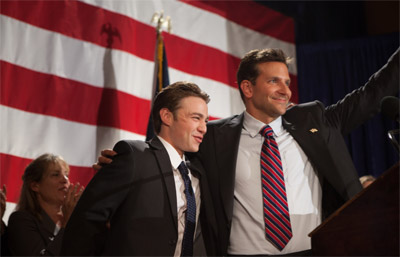 Question: Luke's story is not yet concluded when we meet Avery (Bradley Cooper).
Question: Luke's story is not yet concluded when we meet Avery (Bradley Cooper).Question: How does Avery get to the point where we meet him, and then afterwards?
Derek Cianfrance: This is a guy who, since childhood, has had the ability to see and find his way. He's been the high road example, known and renowned for his best traits: a good fellow, popular, fair, honest, truthful, strong, high IQ. Avery has been born into this small city's royalty, being the son of a powerful judge [played by Harris Yulin]. Everyone in his life – his dad, his college sweetheart [played by Rose Byrne] who he's married – assumes that Avery will follow in his father's footsteps. Only Avery wants to be his own man. Against his father's wishes, he has dropped out of law school to build himself from the ground up. Nobody understands why he would resist the silver spoon. So when we first meet Avery, he is a 28âyearâold rookie cop…
…and, on duty, he makes a mistake. That creates a toxic shame in him, one which he can't speak about. He is now in a state of being wrong for the first time and is painfully aware of his guilt. Meanwhile, the world considers him a hero and so he feels like even more of a sham, and inadequate.
This inner conflict creates a gulf in Avery's relationship with his wife and young child, and also puts him at odds with growing corruption at work. So he must choose: battle against the demons inside him, or go to battle against people in real life? He decides to bury his own problems and focus on problems in the world. So he goes out and he does good things. But to not heal the wounds inside himself and to try to fix everything else around him is a tragic flaw, one which will haunt him.
Question: These are two very different characters. How about the actors playing them?
Derek Cianfrance: They are both much more than actors in this film, they are true collaborators. Ryan and Bradley both have tremendous instincts for character and story and dialogue, and they are both brave enough to go to the vulnerable places I needed them to go to up on the screen. They each do a lot of research and go the distance for you.
Ryan has this incredible presence and charisma onâscreen and in real life. He's inherently interesting and cinematic, but he also makes everyone around him better. I have learned so much from him, and feel incredibly fortunate each time I collaborate with him. Now we have more of a shorthand, and can get at what we want even faster.
When I met Bradley, I saw that he had the same kind of charisma that Ryan has. But the thing that sold me on Bradley more than anything else was how hard he worked. After meeting with him a couple of times I went back to the script and reworked the character, because I knew Bradley could go deeper than I originally had in mind.
I think the reason Pines works is because Ryan and Bradley are not only movie stars and great actors, but also compelling human beings. Each brings a different energy to the movie, creating a balance and also a dichotomy.
Question: What is the significance of the imagery of the trees, and why exactly are they pines?
Derek Cianfrance: Let's start with the title – the Iroquois translation of Schenectady is 'the place beyond the pines." Schenectady is where my wife grew up. So I have been going up there for a decade visiting her family, and it's such an interesting place. There are different tribes in a contemporary city. It has a rich history and it's definitely in the midst of the economic struggle. My coâwriter, Ben Coccio, who grew up there, describes it as a smaller version of Detroit. Ben came up with the title of the movie, and I loved it because it has a literal meaning – there is a clearing that characters visit onâscreen – and other, more metaphorical meanings; it's where you can find your demons, or your destiny, or both.
We shot the film in Schenectady for 47 days, which was a long time given our budget. Because of my training in documentary film, it was important to me to shoot in real places – I felt strongly that it could only be made in Schenectady – and to surround the actors with real people as much as possible to give the film that sense of place and truth. So we shot in live locations: a functioning police station with Schenectady police officers, a working hospital with nurses and patients in the next room, an active fair with 500 people who we were counting on not to look into the camera lens, real banks with real bank tellers and bank managers who had been robbed before, and a high school with actual students. This was all to lend authenticity to the moments we were capturing. I asked everyone everywhere – cops, bank tellers, doctors, judges – to make sure that the scenes we were doing were true. And if I was told that they weren't, then I would rewrite scenes on the spot until we were being honest.
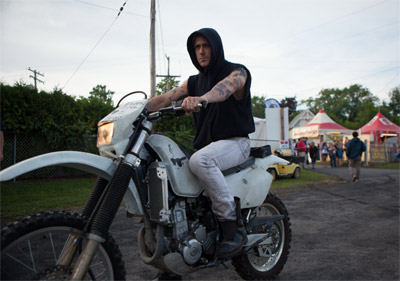 Question: Aside from Schenectady itself, where did your inspiration come for this story?
Question: Aside from Schenectady itself, where did your inspiration come for this story?Derek Cianfrance: It started with Abel Gance. In film school, I saw his Napoleon, which plays out on three screens at once. So I became obsessed with the idea of making a triptych film. I had been a student with Stan Brakhage and Phil Solomon, who rooted me in aesthetics and formalism. However, Phil used to always tell me, 'Form must illuminate content." I thought I could make the three screens sing, but I didn't know the song. So I kept marinating on the idea of three until I had a story with purpose. In 2007, a few months before the birth of my second son, the film finally came to me. I had been thinking a lot about being a father and becoming one again and the responsibility that came with it, what I was going to pass down to my new boy.
That got me to thinking about the fire I felt inside me, which had been with me for as long as I could remember. It helped me to do many things. But it was also, many times, a destructive and painful force. It shapes who you become, but you have to take control of it. I knew that my father also had this fire in him, and his father as well… I started wondering how many generations back it went. I began to wish that my new boy would be born without this fire. I didn't want to give him all of my pain and mistakes; I wanted him to have his own path.
I had also been reading just about everything that Jack London wrote, and I was taken with the idea of legacy and the callingâback of ancestors – which happens in The Call of the Wild. You want your bloodline to survive, to be better than you. I thought about how time does things to people and their families. I felt I now had a story to tell.
Question: Did you start writing the script at that time?
Derek Cianfrance: Not until I went out to find somebody to write with, because I simply cannot write alone; I'm a filmmaker because I like working with others. If I wanted to create alone, I would be a painter. I was introduced to Ben Coccio, who made this great underappreciated movie Zero Day. We met at The Donut Pub in NYC and he told me he was from Schenectady. We hit it off: we had read the same books, watched the same films growing up – GoodFellas is a favorite – and we had read the same books. Ben latched on to the idea of Pines; he just lit up. I went off to keep trying to make Blue Valentine, and he started writing.
Blue took a while longer, and Ben kept writing. I'd give notes on Pines and every so often we would work on it together. The first draft was over 160 pages. Ben would always reference Giant, and his script was definitely ambitious. When Ben and I started writing together at length, we spent a lot of time refining the script.
Question: What was the involvement of the third credited screenwriter, Darius Marder?
Derek Cianfrance: About four months before we started filming Pines, my good friend Darius got involved. His documentary feature Loot was all about fathers and sons, men who were haunted by their past; I knew he had a handle on those themes. He and I have kids in the same school – there's more of a connection with fathers and sons – and we would drop our kids off in the morning and write all day until we had to go pick them up. The story and the characters continued to jell. This movie was so big it did take all three writers to get it together. By the time of filming, we'd hit 37 drafts.
Again, as with Blue, I considered all of the actors in the film to be true collaborators. That could also mean being additional writers; I was always urging them to go off--ââscript and make it fresh, make it alive, make it true.
Question: This had a bigger cast than Blue Valentine. Did that affect your direction of the actors?
Derek Cianfrance: Not really. There was complete commitment from our actors. There were no fancy hotels in Schenectady, and we couldn't afford big trailers. Our preparation and shooting schedules required incredible amounts of time and energy, and we were filming in places with bee hives and mosquito infestations. I never heard a complaint.
I had a dream cast, and I am eternally indebted to them. To think that Ray Liotta is actually in one of my movies, after seeing GoodFellas dozens of times in the movie theater when I was a teenager…
Question: What was the rehearsal process like? Was there extensive improvisation, like on Blue Valentine?
Derek Cianfrance: Yes. To me, process is everything. The experience of making a film is what's important. I love shooting, I love working with actors. I love being surprised, I love making discoveries. I love it when things break, when they don't go as planned.
On Blue, we were dealing with love as a theme, which is universal; everyone knows what it feels like to be in love. So the points of reference for the actors were inside themselves. On Pines, not everyone has robbed a bank; not everyone has been a cop or know people who have been or are. So there was a lot more research to be done.
Question: What kind of research?
Derek Cianfrance: Ben Mendelsohn [who plays Luke's friend Robin] and I met with this guy who had robbed a halfâdozen banks in Schenectady –
Question: How did you get ahold of him?
Derek Cianfrance: Ben and I wanted to get an accurate perspective. So we asked the police in Schenectady if they could make an introduction. All of a sudden, they showed up at my office with a guy who was fresh out of prison and open with us about everything. I remember him saying, 'The one thing movies get wrong is, bank robberies are messy in real life but in movies they are always perfect." So we also went to local banks and talked with people there, some of whom had been through robberies. I'd as, 'Tell me how it happened with you." Our guy from prison had done these robberies but…well, the word the people used was 'nicely," so he'd served less time.
Question: So the police department cooperated a lot with the production?
Derek Cianfrance: Yes. Bradley Cooper, Ray Liotta, and the actors playing Avery's fellow cops spent time with the real officers in Schenectady. They did ride--ââalongs and then went into households where calls had come in from, and got invited over for family feasts. One thing we changed in the script as a result was Avery being the only cop in his police car; in Schenectady, they don't ride with partners.
Bradley wore the chain of St. Michael, the patron saint of the police. He learned about holding a gun, about protocol, about why police offers chew gum – it's to keep calm, they call it their 'Prozac." He and I talked to a police officer who had been shot in the line of duty and had also killed someone in the line of duty – which, he told us, was harder to get over. He's still not over it.
It was total and complete immersion so that we could learn everything we needed. We were open to throwing anything away if it wasn't true. We tried to make everyone who helped us proud.
Question: What about those actors who weren't playing cops or robbers?
Derek Cianfrance: It was the same process. For instance, Rose Byrne spent time with divorced wives of cops and then she spent days playing house with Bradley Cooper – days, mind you, when we weren't shooting. When an actor of Rose's caliber commits herself like this, it is a true gift. Same for Bruce Greenwood [who plays opposite Cooper as investigating D.A. Bill Killcullen], who shadowed the Schenectady D.A. for a week.
Question: What did Eva Mendes bring to the film, and to the role of Romina?
Derek Cianfrance: I met Eva right after I did Blue Valentine. I had always been a fan of her work, especially in James Gray's We Own the Night. She has such a magnetic screen presence, and has often ended up in gratuitous roles as the sex object – although I liked how slyly she played with that in The Other Guys. When Pines was coming together, I met with a number of actresses but I kept thinking about Eva. I had a hunch that, given the chance, she could knock this role out of the park. Eva came to see me with no makeâup on; she still looked beautiful, but it meant so much to me that she was trying not to. Instead of having her audition, I asked her to take me for a ride around Los Angeles and show me the places where she grew up. Sitting in the passenger's seat of her car, I saw the deep, thoughtful, warm, generous, unpredictable person inside Eva. She opened up about herself, her life, her past. I offered her the role.
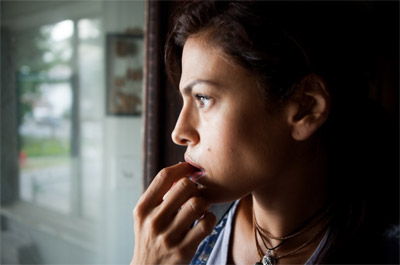 She and Ryan had known each other a little before we shot, which added a tangible dimension to Luke and Romina's relationship on-screen.
She and Ryan had known each other a little before we shot, which added a tangible dimension to Luke and Romina's relationship on-screen. The first scene we shot with Eva was the sex scene in the trailer with Ryan. I know she was terrified to do it because she was trembling, but she is brave; she embraced her fear and confronted it and bared her soul. The small crew that day was left speechless and inspired by her bravery – which continued every day with her.
Question: Can you talk about the action scenes, and how everyone approached those?
Derek Cianfrance: One thing Blue was noted for was its frank sexuality. On Pines, I wanted to approach the action scenes in the same way. They had to feel like they were happening in the real world, like the rest of the movie.
This meant that Ryan Gosling had to learn how to ride a motorcycle. The most complicated scene was where Luke goes into a bank, robs it, leaves the bank, escapes on his motorcycle, and drives at tremendously fast speeds through a busy intersection amidst lots of other cars while being pursued by a cop. All of this happens in a single take, no place to do a 'Texas switch." So Ryan had to become very proficient on the bike. He trained with Rick Miller, one of the great Hollywood stunt men, six hours a day for two months. His prowess took our breath away. In order to get that scene completed, Ryan did 22 takes. Every time, he almost got hit.
For other scenes, it had to be stunt men. I was blessed with a great team of stunt drivers led by Brian Smyj. I felt they were excited to be a part of Pines because normally they would risk their lives doing a stunt for a massive movie and then see their death--ââdefying feat reduced to 14 frames in the final product. I didn't want to cut within the action scenes. My points of reference were Cops and World's Wildest Police Videos. The stunt team was up for all that, but I will never forget the feeling in my stomach watching Rick Miller lay down his bike at 65 miles per hour for a shot. Those stunt guys and gals are true warriors.
Question: Can you contextualise the third story, set 15 years after the earlier ones?
Derek Cianfrance: In a way, the first two acts of this movie serve as prologue to the third. It's in the third part of the film where legacy, what the movie is about, comes up.
Luke's son Jason [played by Dane DeHaan] is a kid who has grown up in a warm home. He has a good mother, a good stepfather, a lot of love in his house. But there's something missing from his life and he knows it. He has been lied to and protected from a truth, and that mystery won't let him go. He's heroic because he searches for that truth even if it will destroy him.
Avery's son AJ [played by Emory Cohen] is a kid who seemingly has a lot: born into money, he has his mother's love and attention. What he doesn't have – and hasn't had – is his father present in his life.
So both of these boys are missing a father, and they each deal with it in different ways. AJ doesn't really have a connection with his father; he's hurt by that, and everything he does is a scream for attention from his dad. He puts up barriers to act as if he is not hurting. AJ is a tragic character. He's this overâprivileged kid who is popular but is filled with selfâloathing and selfâhatred. He has a lot of the qualities of his father.
Question: How hard was it to cast these two roles?
Derek Cianfrance: I auditioned over 500 kids. Picking up from where Ryan Gosling and Bradley Cooper leave off in the movie is a mighty task. Very late in the casting process, I found Dane DeHaan and Emory Cohen. Working with them was thrilling because they are both so good and so fresh.
Just as Ryan and Bradley are opposing dualities, so too are the boys. I remember the first audition I had with Dane and Emory opposite each other, this discussion of their favorite actor was. It turned into a fight, Dane insisting on James Dean or Al Pacino and Emory insisting on Marlon Brando or Robert De Niro. I figured that this conflict could carry over into the movie; once we got on the set, I'd just let that dynamic go!
Question: You spent over a decade trying to make Blue Valentine, but it must have been easier getting the financing for this film.
Derek Cianfrance: During the 12 years on the bench waiting to make Blue, I prepared for other projects or opportunities. Because Blue had some level of success, I was able to put Pines together rather quickly.
The crew over at Sidney Kimmel Entertainment responded to the script. From my first meeting with them, it was clear that they were passionate about seeing the best version of the film. I am thankful to them because they gave me a lot of trust, space and time to make the film the way I wanted. They also pushed me to go further where and when I needed to while establishing the right boundaries, which I feel are important for a filmmaker like me. Those let me know where the edge is, so I can play close to the edge and not fall off. Without that, I might go on forever and get lost.
My producers – Jamie Patricof, Lynette Howell, and Alex Orlovsky – are exactly what I want out of producers. We did Blue together, and I hope to make every movie with them. They were the first people to read the Pines script besides Ryan. They challenge me. They aren't pushovers. When they have to, they defend me. They make the crazy dreams in my head come true.
Question: So the production went smoothly?
Derek Cianfrance: With one huge exception: Hurricane Irene struck and Schenectady had its biggest floods in 500 years. The night before she hit, I moved my family out of the house where we were staying. The next morning the house was under 15 feet of water.
We had to cancel production because our equipment trucks were submerged. When I found out that we had two days' worth of filmed footage on one of the trucks, I was beside myself – I've had film negative lost before. The camera department, led by first AC Ludovic Littee, took a canoe out to the truck and rescued our footage. We were back filming the next day.
Question: Who else was on your crew, and what did they bring to the project creatively?
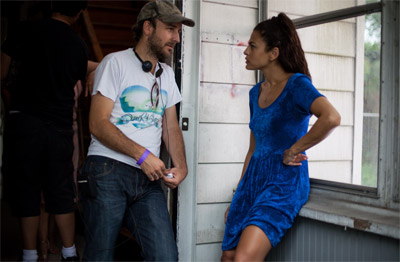 Derek Cianfrance: Our production designer Inbal Weinberg and her team made every room of every house fully functional, even if we weren't going to be shooting in those rooms. Since we were shooting in so many live locations, I needed the actors to continue living in the real world. Inbal did Blue with me, and I love working with her because she never hesitates to disagree with me and fight for her ideas. I love her spirit and her taste. She has a way of going into places and making them iconic without being quirky.
Derek Cianfrance: Our production designer Inbal Weinberg and her team made every room of every house fully functional, even if we weren't going to be shooting in those rooms. Since we were shooting in so many live locations, I needed the actors to continue living in the real world. Inbal did Blue with me, and I love working with her because she never hesitates to disagree with me and fight for her ideas. I love her spirit and her taste. She has a way of going into places and making them iconic without being quirky. The costumer was Erin Benach, also from Blue, who creates such iconic clothes for people to wear in-character. Even more importantly, she collaborates with the actors to find the clothes that will help them to discover their characters. I completely trust her.
Question: You hadn't worked with this cinematographer before. What made you pick him?
Derek Cianfrance: I had already met with a number of DPs, and then Sean Bobbitt told me a lot about his process and how he prefers using handheld cameras and natural lighting, and his theories on camera movement. To me, he has such a strong sense of composition and I wanted Pines to be like flipping through the pages of a storybook. I found out Sean had been a war photographer, so I sensed he would help us all be fearless and he did.
Question: When on the shoot was that a factor?
Derek Cianfrance: We knew the first scene of this film should be an epic shot, taking us, like a dream, from the space of Luke's trailer through a working fairground and into a circus tent where he and other riders would begin riding a motorcycle in a steelâcage 'globe of death" – upside down. Sean wanted to go inside of that globe. So he suited up protectively and we started shooting, did the whole 5âminutesâlong tracking shot and then he went in the center of the globe. I'm watching the monitor, it's beautiful, but then I hear a crash and the monitor goes fuzzy.
I look over at the globe and I see Sean on the bottom of a pile of three motorcycles. The paramedics run in and everyone's asking if he's OK. Sean was – angry he didn't get the shot! He gets up and says, 'Let's do it again!" I say, 'Sean, don't do it again." He says, 'I'm doing it again. We must get this shot and go to the center of it." So we went back to the start point, filmed from the trailer all the way into the center of the globe of death, and again at the same exact moment the monitor goes static. I look up to again find Sean under motorcycles. This time he was even more shaken up and even angrier at himself for not getting the shot. We cancelled the shoot for that night. Around 3:00 AM, Sean woke up in his hotel room and didn't know what country he was in. We took him to the emergency room and it turns out he had a concussion. But the next night we did it all again, and I prevailed upon him not go inside, which wasn't easy. That night we got the shot you see in the film.
Question: What were the challenges in postâproduction?
Derek Cianfrance: I hate editing, and editing this movie was a beast. There was a lot of story to get through, characters to explore. The only thing that made it bearable is the fact that two of my closest friends edited Pines; I've been working with Jim Helton for about 20 years and Ron Patane for about 10. They've edited as a team several times before.
Our first rough cut, after six months, ran threeâand-oneâhalf hours. Overall it took us nine months to fully edit the film – seven days a week and sixteen hours a day.
Question: Was there discussion of intercutting the three sections, crossâcutting among them?
Derek Cianfrance: No. That had come up early on, at the script stage. Other people would then bring it up again when I was looking for financing. But I never considered it. This is a story about lineage, so it needed to be linear. I always wanted an audience to experience the movie that way. There's not the security of a flashback or a shift to lessen the impact when things happen to the characters.
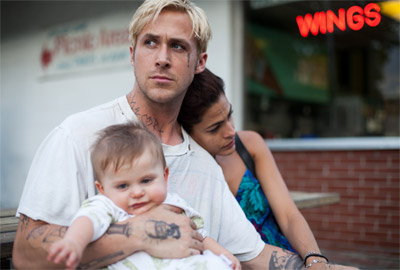 Question: Was the score an easier part of the postâproduction process?
Question: Was the score an easier part of the postâproduction process?Derek Cianfrance: Yes. The single greatest concert I ever went to was Mr. Bungle in Denver in 1991. I remember [the band's member and founder] Mike Patton, wearing a bondage mask and horse blinders, licking the head of a bald bouncer. I always felt his music was so cinematic, and for films I made in high school, I'd always put his music on.
Mike read the Pines script. His brother is a police officer so it was like fate…and, a dream come true for me to get to work with him. He understood the haunted qualities of the story.
Question: Are those qualities what you hope an audience takes away from the film, or, something else?
Derek Cianfrance: One response that meant a lot to me came from a wellârespected and powerful man who shall remain nameless. After seeing Pines, he cancelled his business dinner scheduled for that night. Then he called his exâwife and asked her, 'I know it's your night tonight, but could I come pick him up?" He drove across town, picked up his teenage son, brought his boy home, and they spent time together. I'm not a message filmmaker. I want people to be entertained, to be absorbed by the story, and to take what they will into their own lives.<
MORE
- Emma Stone Magic in the Moonlight
- Jessica De Gouw Cut Snake
- Maxine Peake Funny Cow
- Denzel The Equalizer 2
- Johnny Flynn Beast
- Logan Marshall Green Upgrade
- Shailene Woodley Adrift
- Eric Toledano and Olivier Nakache C'est La Vie...
- André Leon Talley The Gospel According To André...
- Shakespeare In Tokyo
- Mission: Impossible Fallout
- Glenn Close The Wife
- Allison Chhorn Stanley's Mouth Interview
- Benicio Del Toro Sicario: Day of the Soldado
- Dame Judi Dench Tea With The Dames
- Sandra Bullock Ocean's 8
- Chris Pratt Jurassic World: Fallen Kingdom
- Claudia Sangiorgi Dalimore and Michelle Grace...
- Rachel McAdams Disobedience Interview
- SebastiĂĄn Lelio and Alessandro Nivola...
- Perri Cummings Trench Interview



